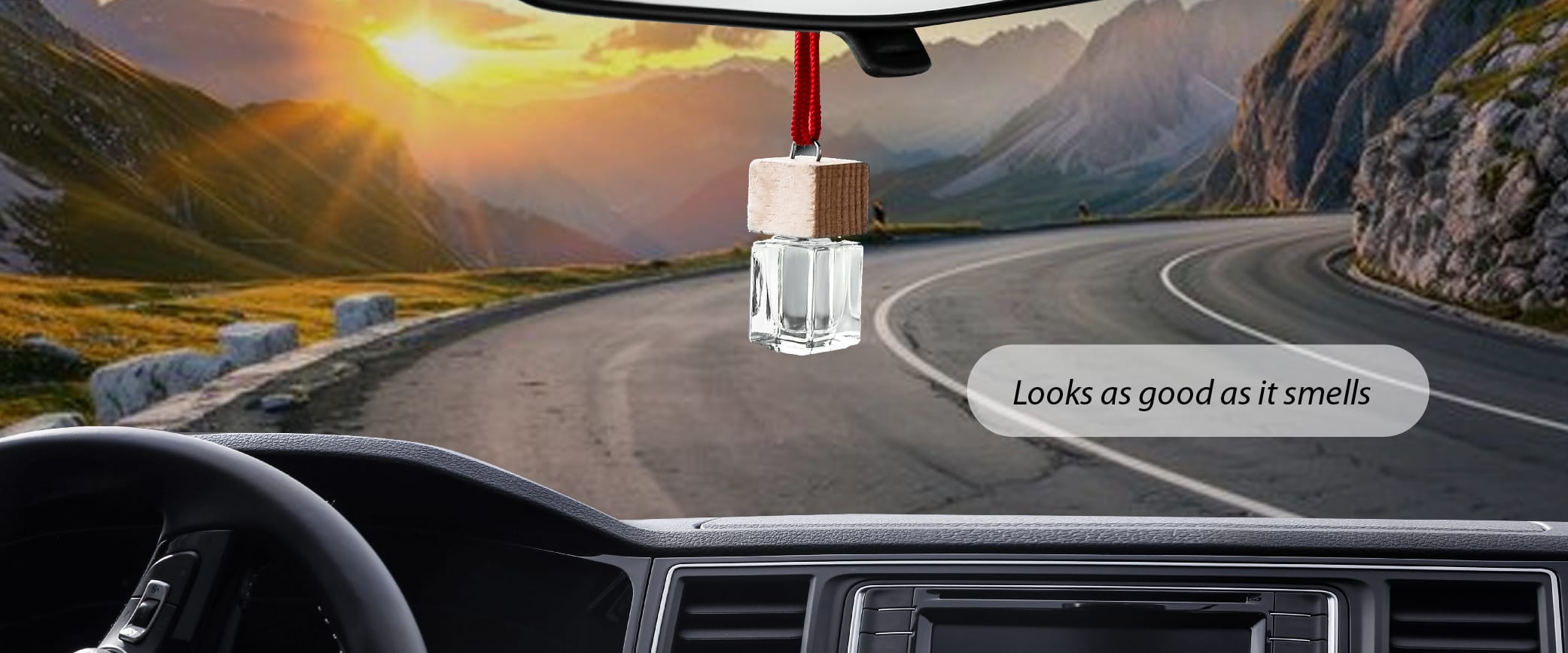Comparing Glass and Plastic: Why Glass Stands Out in the Car Freshener Market

One development in the industry is witnessing is the gradual return to glass packaging in car fresheners as the material of choice for packaging. Today, we shall explore why the shift and its implications
1. Broader Product Range with a variety of fragrance
Glass packaging in car fresheners offers inert and non-porous properties, ensuring that fragrances remain unaltered and consistent over time. This makes it an ideal choice for companies looking to offer a wider variety of scents to meet diverse customer preferences. By ensuring the integrity of each fragrance, glass enables brands to cater to every customer segment, enhancing consumer trust and preference.
Example: Brands like IRIS Aroma Boutique transitioned to glass packaging, citing its ability to preserve scent quality even during extreme Indian summers. This shift allowed them to expand their product range confidently, offering multiple fragrance options without compromising quality, which has significantly boosted customer satisfaction and loyalty.
2. Premium Aesthetic and Brand Positioning
Glass packaging exudes sophistication and quality, making it ideal for premium segments. Its transparency allows creative designs and enhances the visual appeal, setting products apart in competitive markets.
Example: AutoScents India leverages colored glass bottles to match car interiors, appealing to style-conscious urban customers. This approach helps position the brand as a luxury choice in car accessories.
3. Heat Resistance in Indian Conditions
India’s diverse climate can pose challenges for plastic packaging. High temperatures in regions like Rajasthan can cause plastic to warp, melt, or release chemicals. Glass, being heat-resistant, maintains its integrity and ensures the safety of its contents.
Example: FreshCar India specifically designs glass-bottled car fresheners for regions with extreme heat. This provides consumers with durable, safe products, especially in scorching summer conditions.
4. Health and Safety Assurance
Plastic, especially when exposed to heat, can release harmful chemicals that compromise air quality. Glass packaging in car fresheners, being chemically inert, is safer and aligns with the rising focus on health, particularly in urban areas where respiratory concerns are prevalent.
Example: EnviroScents India markets its glass-packaged essential oil car fresheners as toxin-free and safe, a key selling point for health-conscious buyers.
5. Upcycling and Reusability
The fact that glass can be reused or refilled helps reduce waste, adding long-term value. Indian consumers, who often appreciate economical and sustainable solutions, find this feature particularly appealing.
Example: GreenDrive India runs a refill program for its Glass packaging in car fresheners, encouraging consumers to reuse their containers. This initiative not only supports sustainability but also builds brand loyalty.
6. Compliance with Regulatory Standards
India’s evolving environmental and safety standards increasingly favor sustainable materials. Glass, free from microplastics and chemical leaching, helps brands meet these requirements and reinforces consumer trust.
Example: EcoRays Fresheners adopted glass packaging to comply with India’s Extended Producer Responsibility (EPR) guidelines. This proactive shift has strengthened their reputation as a responsible brand.
7. Market Trends and Growth
The Indian car freshener market is estimated at INR 250 crore and is growing at a compound annual growth rate (CAGR) of 13% (2022-2027). Consumers are showing a clear preference for eco-friendly and natural air-care products, pushing brands to innovate their packaging strategies.
Major players such as Godrej Aer and Dabur Odonil are exploring glass packaging for premium product ranges: glass’s durability, aesthetic appeal, and eco-friendliness position it as the preferred choice for modern consumers.
Glass vs. Plastic: A Comparative Analysis
—
| Feature | Glass | Plastic |
| Material Integrity | Non-porous and chemically inert, ensuring fragrance purity | Permeable and prone to chemical interactions, altering fragrance quality |
| Sustainability | 100% recyclable and eco-friendly | Limited recyclability; contributes to environmental pollution |
| Aesthetic Appeal associated with lower- | Premium look with transparency for creative designs | Lacks the luxury feel; quality products |
| Durability | Heat-resistant but fragile if dropped | Lightweight and unbreakable, but prone to warping in high temperatures |
| Odor Retention | Maintains fragrance consistency | Can absorb or alter scents over time |
| Consumer Preference | Increasingly favored for health and sustainability-conscious buyers | Preferred for its lightweight and cost-effective nature, though this is declining |
Realigning the Industry
The future of the car freshener market lies in combining functionality with sustainability. Brands that adopt glass packaging can differentiate themselves by offering higher quality, safer, and environmentally friendly products. This transition aligns with evolving consumer preferences and government regulations, ensuring long-term success in a competitive landscape.